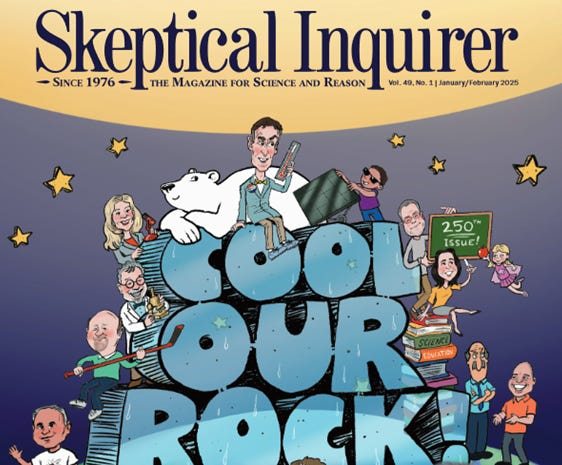Why is Skeptical Inquirer Never Skeptical About Climate Change?
The popular science magazine is fully signed up to the regime consensus on Magical CO2 and its super-heating properties
July 2nd is World UFO Day, no doubt much to the disgust of leading US popular science magazine Skeptical Inquirer, which, issue after unbearably smug issue, devotes much unnecessary time and effort to trying to disprove wild claims that shoddily-built alien spacecraft ever crashed at places like Roswell.
Supposedly, it is a matter of profound public importance that some mistaken people really do believe such things, as accepting such ‘anti-scientific’ ideas opens the ever-credulous general public up to belief in supposedly even more harmful ‘anti-rational’ beliefs, such as vaccine-wariness, climate-hesitancy or maybe even voting for Donald Trump! I don’t think it does; I think it just keeps some people happy and entertained after work-hours, harmlessly reading about charred alien corpses being spirited away by the CIA. Associating saucer-crash fans with climate-dissenters is just a crude rhetorical sleight-of-hand, akin to the old trick of subliminally linking them to Holocaust-deniers by calling them ‘climate-deniers’.
Special K
The general idea can be well summarised by a new book from author Matthew Hongoltz-Hetling, a fellow-traveller of the US Skeptical movement. In specialist usage, the upper-case ‘Skeptic with a k’ American spelling has a specific ideological connotation, as opposed to the lower-case UK spelling ‘scepticism with a c’, which is supposed to be more about temporarily suspending belief and assessing all evidence and propositions critically and dispassionately. If you think about public figures like Richard Dawkins and James Randi, then they are good examples of ‘Skeptics with a k’ – i.e., ideologues in disguise. Called The Ghost Lab: How Bigfoot Hunters, Mediums, and Alien Enthusiasts Are Wrecking Science, an extract of Hongoltz-Hetling’s book appeared on popular current affairs site UnHerd last week:
The annual Chapman University survey of American fears found that paranormal beliefs of all sorts spiked in the years following Donald Trump’s 2016 election. Between 2016 and 2018, Americans became approximately 10 percentage points more likely to believe that aliens have visited the Earth in modern times; seven percentage points more likely to believe in Bigfoot; and 11 percentage points more likely to believe in haunted houses. … [You can] put this down to a shift in the nature of trust, with faith in individual experience replacing faith in institutions. …
Now, a distrustful public has re-elected Donald Trump, a man who in 2017 attempted to appoint a ghost-hunter as a federal judge. The President has since escalated his war on science and expertise by pledging a wholesale dismantling of government agencies, as well as academic and science research institutions and journals. … And he’s being cheered on by Americans who have completely rejected the value of science and see Trump as the heroic disruptor of a corrupt system. The role that the paranormal plays in this is under-appreciated. Those who believe they have encountered a spirit are faced with a mystery: why does the scientific establishment dismiss the existence of something that seems self-evident to a majority of Americans? The common assumption is that science is either a poor tool to understand the universe, or that mainstream scientists are engaged in a massive cover-up. This sets the stage for various conspiracy theories. … Unless [scientific institutions] take imaginative steps to rebuild public trust, science may become just another disembodied voice haunting the minds of a credulous public.
So, that’s another thing for weeping liberals to blame Donald Trump for, then: belief in Skinwalker Ranch, the Amityville Horror, and the Bermuda Triangle.
The general outlook of Skeptical Inquirer magazine (other than ‘Hahaha, we’re cleverer than you, sad little plebian!’) can be summed up pretty well by the following cover, from 2023. See that looming silhouette-demon? To go all Newman and Baddiel for a moment, that’s you, that is, that’s your dark black idiot-soul:
You’d think a hardline anti-paranormal magazine wouldn’t believe in demons; they do when they’re demons in human form who vote Republican and doubt the Immanuel Velikovsky-topping world-ending effects of carbon dioxide. When the above cover talks distastefully about the “Ideological Subversion of Science”, it assuredly doesn’t have bodies like the IPCC in mind.
For a “skeptical” magazine, Skeptical Inquirer often seems to adopt a position of hard-core, religion-aping belief in many of the key Skeptical shibboleths that appear in its pages. The Daily Sceptic (‘Sceptic with a c’, and not only because it’s based in Britain) tends to be generally Establishment-querying in its opinions. Skeptical Inquirer, on the other hand, tends to reliably reinforce Establishment ideologies in its contents, both scientific and political. Its true title should be the Uncritical Inquiry-Blocker.




